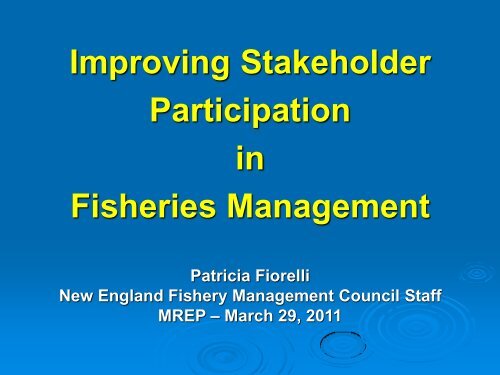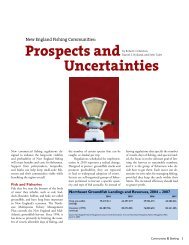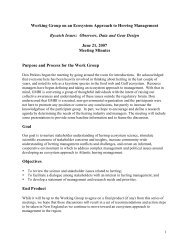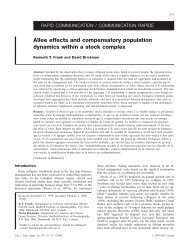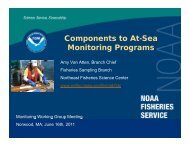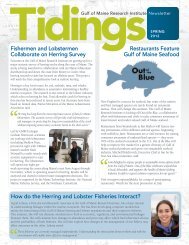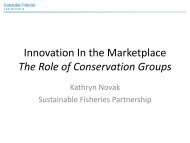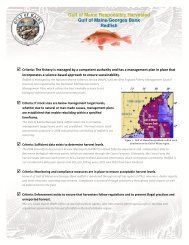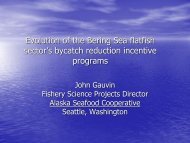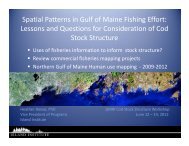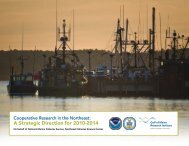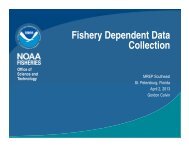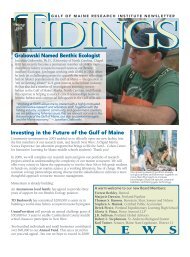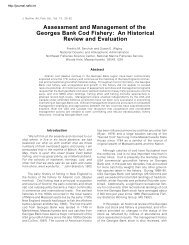How to Participate in the Process
How to Participate in the Process
How to Participate in the Process
You also want an ePaper? Increase the reach of your titles
YUMPU automatically turns print PDFs into web optimized ePapers that Google loves.
Improv<strong>in</strong>g Stakeholder<br />
Participation<br />
<strong>in</strong><br />
Fisheries Management<br />
Patricia Fiorelli<br />
New England Fishery Management Council Staff<br />
MREP – March 29, 2011
Elements of Successful Management<br />
1. Availability of timely scientific<br />
<strong>in</strong>formation<br />
2. Quality and quantity of <strong>in</strong>formation<br />
3. Opportunity for thorough analyses of<br />
options under consideration<br />
4. Fish<strong>in</strong>g community and public <strong>in</strong>put<br />
EARLY <strong>in</strong> <strong>the</strong> process (scop<strong>in</strong>g and<br />
development of alternatives)
Importance of Effective Participation<br />
• Intent of <strong>the</strong> Council process is <strong>to</strong><br />
maximize public participation<br />
• Effective participation <strong>in</strong>creases<br />
<strong>in</strong>dividual and organizational<br />
credibility<br />
• Effective participation allows<br />
fishermen <strong>to</strong> make <strong>the</strong> maximize time<br />
off <strong>the</strong> water and <strong>in</strong> meet<strong>in</strong>gs
Importance of Effective Participation<br />
• Reduces end-runs (undue political<br />
<strong>in</strong>fluence and lawsuits)<br />
• Results more effective and acceptable<br />
• Improves compliance<br />
• Reduces regula<strong>to</strong>ry costs on fishermen<br />
• <strong>Process</strong> is defendable <strong>in</strong> court (and<br />
required by law, NEPA)
Importance of Effective Participation<br />
• The Council relies on fishermen’s expertise<br />
<strong>to</strong> complement available scientific<br />
<strong>in</strong>formation and <strong>to</strong> develop effective FMPs<br />
• Scientific data are not always complete and<br />
management options are rarely perfect –<br />
community and public participation can<br />
lead <strong>to</strong> better technical solutions<br />
• Effective participation is critical for <strong>the</strong><br />
long-term fisheries management success
Council <strong>Process</strong><br />
‣ Integrated public participation of those<br />
affected by and <strong>in</strong>terested <strong>in</strong> effective<br />
fishery regulations<br />
‣ Follows NEPA requirements (and more)<br />
‣ Normal process – public scop<strong>in</strong>g;<br />
hear<strong>in</strong>gs on draft EIS with analysis of<br />
alternatives; f<strong>in</strong>al choice and comment<br />
on proposed rules that implement that<br />
choice
FMPs, Amendments and Frameworks<br />
Committee and Council identify management issues<br />
SCOPING – Council seeks comments on management issues<br />
Committee and Council select options for analysis<br />
Stakeholder Proposals<br />
Input from Advisors<br />
PDT analyzes measures and develops Draft EIS<br />
PUBLIC HEARINGS – and 45-day public comment period<br />
Committee and Council select f<strong>in</strong>al measures<br />
for submission <strong>to</strong> NMFS<br />
Public Comment<br />
Input from Advisors
Council<br />
Committee/Advisors<br />
Direct committee <strong>to</strong> develop: problem statement, management<br />
strategy, goals and objectives, measures acceptable <strong>to</strong> achieve<br />
goals, PDT task<strong>in</strong>g and timel<strong>in</strong>es. Focus on timel<strong>in</strong>es and<br />
consequences of delay.<br />
Take action as directed by Council. Give<br />
direction <strong>to</strong> PDT. Consider <strong>in</strong>put from advisory<br />
panel and public.<br />
FMP<br />
Development<br />
<strong>Process</strong><br />
SSC<br />
Refer <strong>to</strong> operat<strong>in</strong>g policies (page 15) for <strong>the</strong> SSC for a<br />
complete description of SSC responsibilities.<br />
Council<br />
Approve problem statement, management<br />
strategy, goals and objectives, etc. from<br />
Committee.<br />
PDT<br />
Develop options as directed by<br />
Committee and Council,<br />
conduct technical analyses, and<br />
write plan documents.<br />
Committee<br />
Review PDT options, advisory<br />
panel advice and public <strong>in</strong>put.<br />
Ref<strong>in</strong>e or choose preferred<br />
alternative and prepare report<br />
<strong>to</strong> Council.<br />
Advisors<br />
Review PDT options and give advice<br />
(recommendations <strong>to</strong> ref<strong>in</strong>e) <strong>to</strong> Committee.<br />
Provide f<strong>in</strong>al advice on<br />
management program.<br />
SSC<br />
Council<br />
Review PDT options, committee, SSC<br />
and advisors' recommendations, take<br />
public comment and approve f<strong>in</strong>al<br />
measures for plan.<br />
Evaluate and critique effectiveness<br />
of plan and measures <strong>to</strong> meet FMP<br />
objectives.<br />
PDT<br />
NMFS<br />
Review, approve,<br />
implement and adm<strong>in</strong>ister<br />
plan.
Why should you participate?<br />
• To provide your expertise and experience<br />
• To be <strong>in</strong>volved <strong>in</strong> decisions about your<br />
livelihood – allocation<br />
• To get <strong>the</strong> “scoop” firsthand – <strong>to</strong><br />
understand <strong>the</strong> legal requirements and<br />
<strong>the</strong> social/economic impacts of<br />
management decisions<br />
• To educate and <strong>in</strong>volve o<strong>the</strong>rs <strong>in</strong> your<br />
community
<strong>How</strong> can you participate?<br />
• Get <strong>in</strong>volved EARLY <strong>in</strong> <strong>the</strong> process<br />
• Attend committee and Council meet<strong>in</strong>gs<br />
when proposals are be<strong>in</strong>g developed<br />
• Become an advisor for <strong>the</strong> fisheries <strong>in</strong><br />
which you are <strong>in</strong>volved<br />
• Submit comments on management<br />
proposals and attend public hear<strong>in</strong>gs
Guidel<strong>in</strong>es for Provid<strong>in</strong>g Public<br />
Comments<br />
‣ Public comments at Council meet<strong>in</strong>gs<br />
‣ Limits on comments<br />
‣ Additional time for comments at Council<br />
meet<strong>in</strong>gs<br />
‣ Submission of written materials<br />
‣ Public <strong>in</strong>put at o<strong>the</strong>r types of Council<br />
meet<strong>in</strong>gs (committees, hear<strong>in</strong>gs, etc)<br />
‣ Don’t pick fights – “you people”<br />
‣ Suggest solutions – not objections<br />
‣ Recognize that your fishery observations,<br />
although important, may be localized
O<strong>the</strong>r Important Elements of Participation<br />
• Communicate with Council members<br />
• <strong>Participate</strong> <strong>in</strong> local <strong>in</strong>dustry groups and<br />
talk <strong>to</strong> o<strong>the</strong>r stakeholders<br />
• Work with o<strong>the</strong>rs <strong>to</strong> develop management<br />
proposals and <strong>in</strong>itiatives<br />
• Talk <strong>to</strong> advisors<br />
• Talk <strong>to</strong> Council staff<br />
• Encourage o<strong>the</strong>rs <strong>to</strong> get <strong>in</strong>volved
Where Can You Get Information?<br />
• Make sure you are on <strong>the</strong> Council’s mail<strong>in</strong>g<br />
lists<br />
• Check <strong>the</strong> NEFMC and NMFS websites: -<br />
www.nefmc.org = www.nero.noaa.gov/nero,<br />
(look at l<strong>in</strong>ks <strong>to</strong>o!)<br />
• Talk <strong>to</strong> Council members and advisors<br />
• Check with <strong>the</strong> Council staff – <strong>the</strong>y will<br />
always give you <strong>the</strong> best <strong>in</strong>formation!<br />
• Read fisheries-related publications
<strong>How</strong> Can You Be Effective?<br />
‣ Tim<strong>in</strong>g: earlier is (usually) better<br />
(example: Council sets management<br />
priorities each November)<br />
‣ Organization<br />
‣ Do your homework – understand <strong>the</strong><br />
issues<br />
‣ Persistence<br />
‣ Patience - <strong>the</strong>re are different po<strong>in</strong>ts of<br />
view – not adversaries


